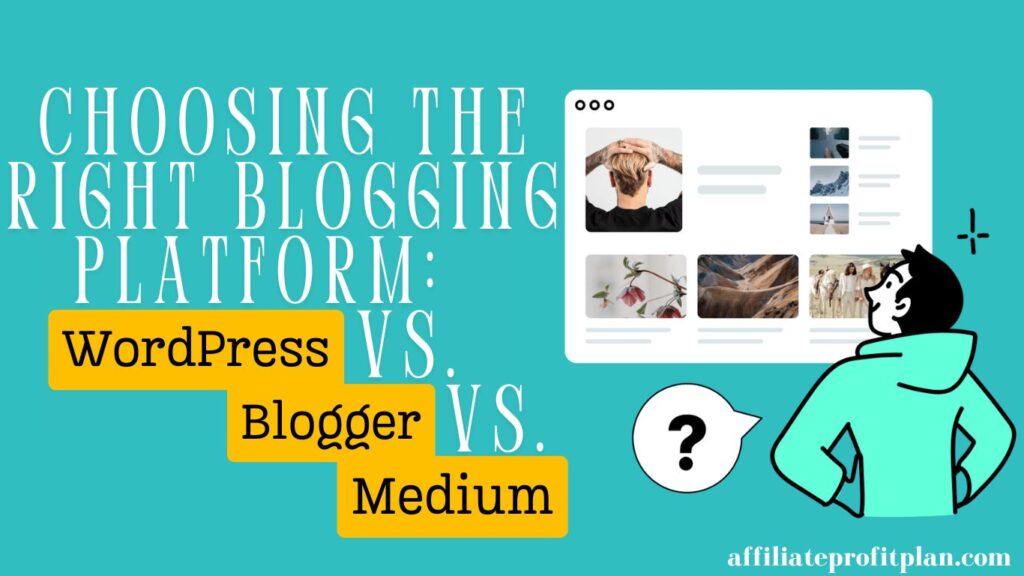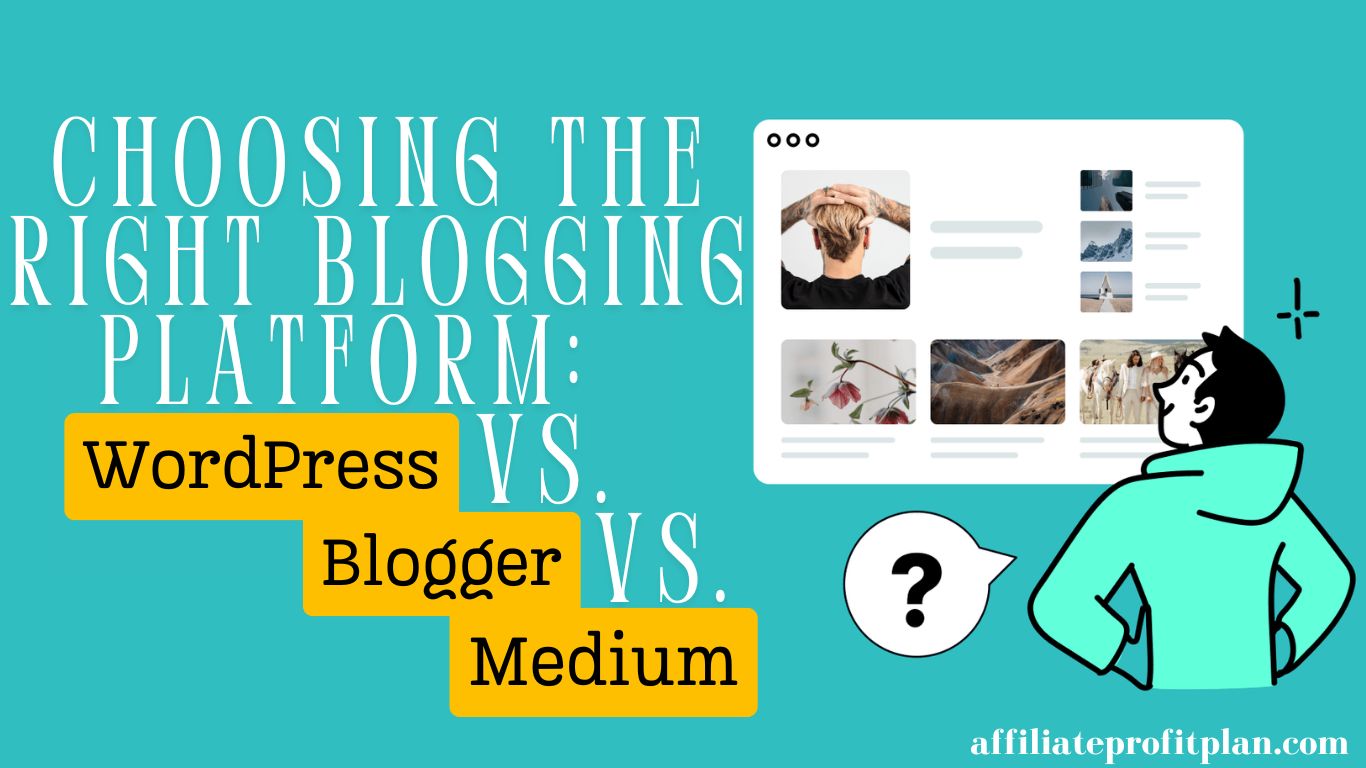Welcome to my article Choosing the Right Blogging Platform: WordPress vs. Blogger vs. Medium. So, you’ve decided to start a blog—congrats! 🎉 Whether you’re aiming to share your expertise, build an online business, or just rant about your cat’s questionable life choices, you need a solid blogging platform. But with so many options out there, how do you choose the right one? It’s like picking between coffee, tea, and energy drinks—all have caffeine, but they serve different purposes.
WordPress, Blogger, and Medium are three of the most popular blogging platforms, and each has its strengths (and quirks). WordPress is like a high-end customizable espresso machine—powerful but requires some setup. Blogger is the instant coffee of blogging—quick, simple, and straight to the point. Medium? That’s the trendy café where you write your thoughts and hope someone appreciates your deep reflections. The big question is: which one is best for you? In this article, we’ll break down the differences in ease of use, customization, monetization, SEO potential, and ownership. Whether you’re a complete beginner or a future blogging superstar, this guide will help you make the right choice. Let’s dive in!
Access My Proven Blueprint for $50-$100 Daily Income – Watch This FREE Video Now >>>

Ease of Use & Setup
Starting a blog should feel exciting, not like you’re trying to hack into the Pentagon. The easier the setup, the faster you can start writing and, you know, actually blogging. Let’s break down how WordPress, Blogger, and Medium compare when it comes to ease of use.
WordPress: The DIY Powerhouse 🛠️
If WordPress were a car, it’d be a high-performance sports car—fast, powerful, but requiring a bit of know-how to handle. WordPress.org (not to be confused with WordPress.com) gives you full control over your blog, but you’ll need to buy a domain, get web hosting, and install WordPress yourself. It’s not rocket science, but if you’re allergic to anything tech-related, there’s a slight learning curve. The upside? Once you get the hang of it, you have limitless customization options and control over your content.
Blogger: The No-Fuss, Google-Owned Option ✨
Blogger is the “just add water” solution of blogging. Owned by Google, it’s completely free and lets you start blogging in minutes—no hosting, no setup headaches. Just sign in with your Google account, pick a template, and boom—you’re officially a blogger. The downside? Blogger is about as customizable as a hotel room. You can move a few things around, but at the end of the day, it still looks like everyone else’s space.
Medium: The Minimalist’s Dream ☁️
If you hate the idea of dealing with themes, plugins, or SEO settings, Medium is your best friend. Signing up takes seconds, and there’s no design work needed—just start writing. Medium is all about the content, which is great for writers who just want to focus on storytelling rather than tweaking their blog layout. The catch? You don’t own the platform, meaning you’re at the mercy of Medium’s algorithm and policies.
Verdict: Which One is Best for You?
- Want full control and customization? Go with WordPress (but be ready to put in some effort).
- Need something free and simple? Blogger is a solid choice.
- Just want to write without tech distractions? Medium is perfect.
At the end of the day, the best platform is the one that gets you writing—because a blog that never gets started is just an idea collecting dust.
Customization & Design Options
Your blog’s design is like your online outfit—it tells the world who you are before they even read a word. Do you want a sleek, professional look? A fun and quirky vibe? Or are you happy just rolling with whatever’s given to you? When it comes to customization, WordPress, Blogger, and Medium offer very different levels of control. Let’s break it down.
WordPress: The “Dress However You Want” Option 🎨
WordPress is the ultimate fashion closet for bloggers. With thousands of free and premium themes, you can make your blog look exactly how you want. Want to tweak things further? No problem. You can customize layouts, fonts, colors, and even add fancy animations if you’re feeling extra. Plus, plugins allow you to extend functionality—think eCommerce stores, membership sites, or interactive elements. The downside? Too many options can be overwhelming, and some premium themes cost money. But if you love control, WordPress is your playground.
Blogger: The “T-Shirt and Jeans” Approach 👕
Blogger gives you a few basic templates, and… that’s about it. Sure, you can change colors, fonts, and layouts a little, but deep customization? Not happening. Think of it like a rental apartment—you can rearrange the furniture and put up some posters, but you can’t knock down walls. If you’re okay with a simple, no-frills blog that gets the job done, Blogger works. Just don’t expect a Pinterest-worthy aesthetic.
Medium: The “Minimalist Uniform” 📖
Medium is like that person who wears the same black turtleneck every day—clean, classy, and consistent. There’s zero customization. No themes, no funky fonts, no sidebar widgets. Just a white background, simple typography, and your words. While this ensures a distraction-free reading experience, it also means your blog will look exactly like everyone else’s. Great if you want to focus purely on writing, but not ideal if branding is a priority.
Verdict: Which One is Best for You?
- Want full creative control? WordPress is the way to go.
- Need something basic but functional? Blogger keeps it simple.
- Prefer a no-fuss, distraction-free design? Medium has your back.
At the end of the day, if you want a blog that truly reflects your personality, WordPress wins hands down. But if you’re happy just focusing on content, Blogger or Medium will do the trick. Just remember—no amount of fancy design can make up for bad content, so write something awesome!
Monetization & Earning Potential
Let’s be real—while blogging can be a passion project, it’s even better when it pays the bills (or at least funds your coffee addiction). 💰 But not all blogging platforms are created equal when it comes to making money. Some give you full control, while others keep you on a tight leash. Let’s see how WordPress, Blogger, and Medium compare when it comes to turning your blog into a money-making machine.
Access My Proven Blueprint for $50-$100 Daily Income – Watch This FREE Video Now >>>
WordPress: The “Make Money However You Want” Platform 💸
WordPress is like having your own online business—you can monetize in any way you like. Ads? Check. Affiliate marketing? Absolutely. Selling courses, memberships, digital products? You got it. You can integrate Google AdSense, sign up for affiliate programs, or even launch a full-fledged online store. The only catch? Since WordPress is self-hosted, you’ll have initial costs (domain + hosting), and you’re responsible for setting up monetization strategies. But if you’re serious about making money, WordPress is hands down the best choice.
Blogger: The “Google AdSense & That’s About It” Option 🏷️
Blogger, being a Google product, makes it super easy to enable Google AdSense—you can literally start earning from ads with a few clicks. But beyond that? Options are limited. You can use affiliate marketing or sponsorships, but there aren’t built-in tools for selling products or memberships. Plus, Google technically owns your blog, so if they decide to shut down Blogger (like they’ve done with other projects), your income stream disappears. It’s a decent choice for hobby bloggers, but for serious money-making, it’s pretty restrictive.
Medium: The “Get Paid for Engagement” Model 👏
Medium does monetization differently. Instead of ad revenue or affiliate links, it offers the Medium Partner Program, which pays writers based on how much engagement (reads, claps, and time spent) their articles get. This can work great if you’re writing viral, thought-provoking content, but it’s not a reliable way to build a long-term income. You also can’t place your own ads, use affiliate marketing effectively, or sell products directly. If you want a passive income stream, Medium is probably not your best bet.
Verdict: Which One is Best for Making Money?
- Want full control over monetization? WordPress is the clear winner.
- Looking for an easy, ad-based income? Blogger gets the job done (but with limits).
- Prefer getting paid for writing engagement? Medium works—but only if you attract a big audience.
If your goal is to build a long-term, sustainable income from blogging, WordPress wins by a mile. But if you’re just experimenting or blogging as a hobby, Blogger and Medium can be low-effort ways to make some side cash. Either way, remember: great content is the foundation of any profitable blog!
SEO & Traffic Potential
You could write the best blog post in the world, but if no one sees it, does it even exist? (Deep, right?) That’s where SEO (Search Engine Optimization) and traffic generation come in. If you want your blog to rank on Google and attract visitors like a magnet, your choice of platform matters. Let’s see how WordPress, Blogger, and Medium stack up in the battle for search engine dominance.
WordPress: The SEO Powerhouse 🔥
If SEO were a video game, WordPress would be playing on god mode. With powerful plugins like Yoast SEO and Rank Math, you can fine-tune every aspect of your blog—meta tags, alt text, XML sitemaps, and even keyword optimization. WordPress gives you full control over site speed, mobile responsiveness, and structured data, all of which are key ranking factors. Plus, since you own your domain (unlike on Blogger or Medium), Google treats your site as a legitimate authority. Bottom line? If you’re serious about getting traffic, WordPress is the best option.
Blogger: Decent, But Limited 🚦
Since Blogger is owned by Google, you’d think it would have some SEO magic built-in. And to be fair, it does a decent job—your blog gets indexed quickly, and there are some basic SEO settings (custom URLs, meta descriptions, etc.). But here’s the catch: Blogger lacks advanced SEO tools and offers minimal control over site structure and speed. Plus, many Blogger sites have a “just another blog” feel, which doesn’t exactly scream authority. If you’re blogging casually, Blogger is fine. But for serious SEO? It’s no match for WordPress.
Medium: Great for Instant Traffic, Bad for Long-Term SEO 🚀
Medium has a unique advantage—it already has high domain authority, meaning your articles can rank quickly if they perform well. But here’s the downside: the traffic goes to Medium, not to you. Since you don’t own the platform (or even your own domain), you’re helping Medium grow instead of building your own brand. Plus, Medium has its own ranking system, meaning your content’s visibility depends more on Medium’s algorithm than on Google. If you just want people to read your content quickly, Medium is great. But for sustainable, long-term SEO growth? Not so much.
Verdict: Which One Wins for SEO & Traffic?
- Want full SEO control and long-term traffic growth? WordPress is the clear winner.
- Need a simple, Google-friendly platform but don’t mind limitations? Blogger works.
- Want instant exposure but don’t care about SEO ownership? Medium is an option.
If your goal is to build a high-ranking, traffic-generating blog that lasts, WordPress is the best choice—no contest. But if you’re blogging as a hobby or want short-term visibility, Blogger and Medium can still get you some eyeballs. Just remember: SEO isn’t just about the platform—it’s about creating content people actually want to read!
Ownership & Control
Imagine building your dream house, decorating it just the way you like, and then realizing… you don’t actually own the land it’s on. 😳 That’s exactly what happens when you blog on a platform you don’t control. Ownership matters—because if you don’t have full control over your blog, someone else can change the rules (or worse, take it away). Let’s break down how WordPress, Blogger, and Medium handle ownership and control.
WordPress: Your Blog, Your Rules 🏡
With WordPress (specifically WordPress.org, not WordPress.com), you own everything—your content, your design, your monetization strategies, and even your domain name. No one can take your site down (unless you break actual laws), and you have the freedom to customize and monetize however you want. The catch? Since you’re self-hosting, you need to pay for hosting and domain registration. But in return, you get total control. Think of it like owning a house—you can paint the walls neon green if you want, and no landlord can say otherwise.
Blogger: Google Owns Your Blog (And Can Delete It) 🚨
Blogger may feel like your blog, but technically, Google owns it. If they decide to shut down the Blogger platform (RIP Google+), your blog could vanish overnight. Google also has the right to suspend or remove your blog if it violates their terms—even if you didn’t do anything wrong. While Blogger is free and easy to use, you’re essentially renting space from Google. If you’re okay with that risk, it’s fine for casual blogging, but for serious blogging? Not ideal.
Medium: You’re Just a Guest on Their Platform 🚪
Medium is like social media for blogging—you don’t own anything. Your content exists on Medium’s platform, and they control the rules. If Medium decides to change its algorithm, limit monetization, or (worst case) shut down, you have no control over your content’s fate. You also don’t get a custom domain unless you use a workaround. This makes Medium great for exposure but terrible for long-term blog ownership. If you want to build a personal brand or a business, relying solely on Medium is a risky move.
Verdict: Which One Gives You the Most Control?
- Want full ownership and control? WordPress is the best choice.
- Okay with Google holding the keys to your blog? Blogger is fine for casual use.
- Don’t mind being a guest on someone else’s platform? Medium works—but you don’t own anything.
If you’re serious about blogging and want to own your content, monetize freely, and never worry about losing your work, WordPress is the way to go. But if you’re just blogging for fun and don’t mind the risks, Blogger and Medium can still work—just don’t get too attached!
Conclusion: Which One Should You Choose?
Alright, so we’ve broken down WordPress, Blogger, and Medium like a reality TV showdown—each with its strengths, weaknesses, and dramatic plot twists. But when it comes to choosing the right blogging platform, it all boils down to what you need. Are you looking for complete control, easy setup, SEO dominance, or just a place to casually share your thoughts? Let’s recap the winners in each category.
Access My Proven Blueprint for $50-$100 Daily Income – Watch This FREE Video Now >>>
- If you want full control, customization, and long-term growth → Go with WordPress.org. It’s the best choice for serious bloggers, businesses, and anyone who wants to make money online. Yes, it requires hosting and some setup effort, but in return, you get ownership, unlimited customization, and the best SEO tools in the game.
- If you want a simple, free, and Google-backed platform → Blogger might work. It’s great for hobbyists who don’t want to deal with hosting or tech stuff. But keep in mind—you don’t actually own your blog, and customization options are limited. Plus, Google could decide to pull the plug on it at any time (it’s happened before with other Google services—just saying).
- If you want instant exposure and don’t care about long-term ownership → Medium is your best bet. It’s perfect for writers who just want to publish and tap into an existing audience. But since Medium owns the platform, your content is tied to their rules and algorithms, and your monetization options are pretty restricted.
Final Thought: The Best Blogging Platform Depends on Your Goals
If you’re serious about blogging, WordPress is the smartest investment—it gives you control, flexibility, and long-term growth potential. If you just want a free, no-fuss option, Blogger works (as long as you don’t mind Google calling the shots). And if your main goal is to write and be seen quickly, Medium can get your words in front of readers fast—but don’t expect to build a standalone brand or business.
At the end of the day, your blogging platform should work for you, not against you. So pick the one that matches your vision, hit that publish button, and start creating awesome content!
Thanks a lot for reading my article on “Choosing the Right Blogging Platform: WordPress vs. Blogger vs. Medium” till the end. Hope you’ve helped. See you with another article.










